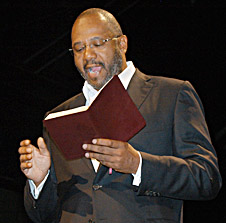Posted: 10/19/07
BGCT presidential nominees
discuss challenges, relationships
The two announced nominees for president of the Baptist General Convention of Texas answered questions posed by the Baptist Standard.
Joy Fenner, executive director emeritus of Woman’s Missionary Union of Texas, and David Lowrie, pastor of First Baptist Church in Canyon, responded by e-mail to a list of questions submitted by the Standard.
|
 |
| Joy Fenner |
David Lowrie |
Fenner, a former missionary to Japan, was elected first vice president of the BGCT last year. She has been endorsed by leaders of Texas Baptists Committed, a political group created to protect the BGCT from the fundamentalist movement that gained control of the Southern Baptist Convention in the 1980s and early 1990s.
Steve Wells, pastor of South Main Baptist Church in Houston, will nominate Fenner, who led Texas WMU from 1981 to 2001.
Lowrie has been pastor of five Baptist churches since he entered the ministry in 1982—First Baptist of Canyon in West Texas, First Baptist of Mabank in East Texas, Timbercreek Baptist in Flower Mound, First Baptist in Roanoke and Northwest Baptist in Milwaukee, Wisc.
Bill Wright, pastor of First Baptist Church in Plains, will nominate him. Both Wright and Lowrie have expressed the desire to see an “open” election, as opposed the process of the last 20 years in which every president was the Texas Baptist Committed-endorsed nominee.
Here are Fenner’s and Lowrie’s verbatim responses to the questions posed by the Standard:
• Why are you willing to be nominated for the BGCT presidency?
Fenner: A number of respected people encouraged me to be a nominee for two primary reasons—to cast a vision of missions for a new day, while still valuing our cooperative missions heritage; (and) to validate the leadership of women at the convention level. In addition, I have a deep personal gratitude for Texas Baptists for the support given me as a missionary and a missions leader.
Lowrie: Our convention stands at a crossroads with a chance to bring unity and healing to Texas Baptists. My background and experiences have uniquely prepared me to lead our convention as we bring Baptist believers together under a common quest for cooperation. We need fresh eyes to take a hard look at our struggles and a fresh voice to call us to action.
• What distinctive perspectives would you bring to the president’s office?
Fenner: A recognition and value of our diverse churches, a network of relationships, multi-cultural experience, administrative skills for leading volunteers, an understanding of the role of president, and a passion for missions.
Lowrie: I have the unique opportunity to be a second-generation BGCT president. I grew up with a deep love and devotion to our convention’s unifying mission. In addition, I have had the honor to serve Texas Baptist churches for over 25 years. I have served churches in East Texas, West Texas, Central Texas and the Dallas/Fort Worth Metroplex. Ordinary, yet remarkable, believers filled the pews of these churches. These experiences gave me a unique understanding of the diversity of our great state, its churches and how its members sought to make a positive difference in the world. Plus, I have been a church planter and a sponsor church pastor in every church I have served, so I understand the nuances of starting new churches from the inside. I also serve a loyal BGCT church that has a working relationship with the SBC.
• What should be the BGCT’s primary emphasis in the coming year?
Fenner: Cast a vision compelling enough that will engage our congregations to do something bold in missions and ministry that would impact each unique local community and the world.
Lowrie: As in every year, our emphasis needs to be mobilizing the greatest missionary force in Texas to touch our communities, and from there, the ends of the earth. Unity comes as we listen for the voice of God emerging from the voices of the ordinary and remarkable voices of Texas Baptists. The BGCT’s leadership has the unique challenge to regain the trust and confidence of our churches so that we can move forward together. We can do this by aggressively dealing with the issues that have undermined our trust, while casting a bold vision of how we can start more churches, reach and keep more people, encourage our struggling churches, train and equip our students, and minister to the least of these together.
• What is the greatest challenge facing the BGCT?
Fenner: The challenges are many—apathy, perceived irrelevance, a need to regain trust.
Lowrie: I believe we have lost connection with many of our churches. During the days of in-fighting, too many of our people watched from the sidelines but were not active participants in the solution; at times they felt like no one was listening. During that time, our vision and direction were determined by a dedicated handful of well-intentioned leaders. If we are going to move forward, I believe we need a unified voice of the many.
In addition, we are losing a generation of young leaders who believe the BGCT is out-of-touch and irrelevant. Our younger generations came to those unfortunate conclusions by growing up watching us fight among ourselves for position and power. They want a mission worth dying for and only see us struggling over who is in control of a slowly sinking ship. By bringing fresh eyes to the BGCT, we can cast a vision around which our young can rally.
• How should the convention and it leaders address that challenge?
Fenner: Communicate openly, focus on the basics of what it means to be a Christ-follower in word and action, maintain strong and effective accountability processes.
Lowrie: If we want to connect with our churches, we need to cast an aggressive vision of reaching Texas and the world with the greatest missionary force the world has ever seen. We need to cast a vision that is big and bold and will demand commitment rather than compliance. However, for us to be heard, we need to listen to our people and learn from each other.
I don’t think there is one specific leader who has the solution to our problems, but I am convinced that if we work together, we will be able to address our problems and claim our future together.
• How should the BGCT relate to the Southern Baptist Convention, the Cooperative Baptist Fellowship, the Baptist World Alliance and other national and international groups?
Fenner: During recent years, churches have increased their network of relationships; each voluntarily relates to a number of different entities. As an advocate of freedom, BGCT should celebrate that.
Similarly, BGCT may relate in multiple ways to various entities through networking, partnerships, formal covenant agreements, or simply through a shared vision of a mission to be accomplished. The world is too lost and too needy for us not to work with other believers for the larger cause of sharing the redemptive love of Jesus.
Lowrie: The BGCT should function as an autonomous full partner with other Baptist organizations. We need to look for points of cooperation with them—unity that advances the work of the kingdom. Yet, we need to remember we should have our own distinct voice rather than being a mouthpiece for any other organization. God did not call us to be a minor-league farm team of another organization but to be his people on mission for his glory.
• How should the BGCT relate to churches that also relate to another state convention in Texas?
Fenner: A Baptist church has the freedom to relate as it chooses; therefore, we are grateful for those who choose to relate to BGCT and respect their decision to relate to other partners.
I would like to see our churches make their choices based on accurate information, knowledge of Baptist distinctives, and on divine leadership for that unique body of believers. We should rejoice with those who are about Kingdom business.
Lowrie: A BGCT church is a church that sacrificially gives to the mission of our convention. What they do with the rest of their offerings is between them and God. There is no such thing as a dually aligned church.
• What role would you play in defining the BGCT’s internal and external relationships?
Fenner: Many do not realize how widespread and complex BGCT is, not only with about 5,700 cooperative congregations, but with its universities, child care institutions, and health care ministries that are located on more than 100 sites in the state. All need to be recognized, valued, supported and celebrated.
In some areas, we need to clarify governance. For example, the elected trustees of a given BGCT institution have the governing and fiduciary responsibility for that specific institution. The BGCT elects an Executive Board from our diverse congregations; that board has specific responsibilities, one of which is to employ an executive director who has responsibility for the Executive Board staff. All of this is BGCT!
Lowrie: I see the president serving the convention as a leader democratically chosen by the people. The president works with the executive director to shape and to cast the vision for our future together and to re-establish the trust of its people. The president’s job is not to oversee the Executive Board staff, but rather to assist the executive director in the implementation of our common vision.
• What role should Texas Baptists Committed play in BGCT life?
Fenner: Texas Baptists should be grateful for the significant contribution of TBC for the past two decades. One part of TBC’s mission is “to uphold historic Baptist principles,” and their changing role to focus on that will be a service to BGCT. When individuals and congregations understand and embrace what it means to be Baptist—priesthood of the believer, autonomy of the local church, soul competency, separation of church and state, religious liberty—that strengthens BGCT and its mission.
Lowrie: The TBC should continue to be a voice into the life of our convention reminding us of our distinctive values as Baptists. I believe this organization of highly committed Texas Baptists should continue to play a role in our future because they have earned a seat at the table by their leadership and sacrifice for our future.
• A new executive director will be selected in the near future. What advice would you offer the new executive director? What is the first thing the new executive director should do upon assuming the position?
Fenner: Pray for God’s wisdom and courage! Gain the trust, confidence, and respect of the leadership of BGCT entities. Travel the state and get to know our diverse congregations; listen! Engage the next generation of Baptist leaders. Seek collaborative ways to maximize ministries that can impact this state; for example, school drop-outs, immigration, restorative justice, family life, abuses, healthcare issues, hurting people, as well as the fact that half the population is unchurched.
Lowrie: I would encourage our new executive director to lead from the middle and to avoid the dangers of being too highly identified with either one of the extreme elements in our convention life. I would encourage the new executive director to begin immediately casting a vision of how we can do more together than we can as a polarized people.
The executive director needs to come into this job with his eyes and ears open and seriously evaluate our current challenging financial situation. He needs to listen and learn quickly so he can act decisively.
Restoring trust to the middle should be a high priority. If he determines staff changes need to be made, I would encourage him to surround himself with men and women who embody our common values and have skills that complement his unique strengths and weaknesses.
News of religion, faith, missions, Bible study and Christian ministry among Baptist churches, in Texas, the BGCT, the nation and around the world.



